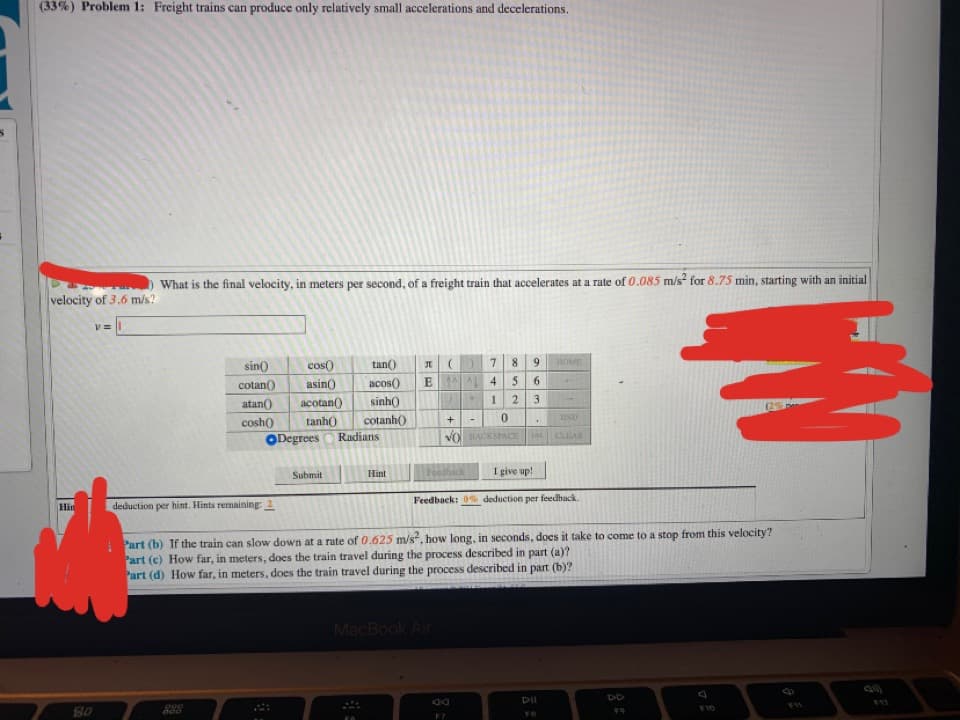What is the final velocity, in meters per second, of a freight train that accelerates at a rate of 0.085 m/s for 8.75 min, starting with an initial ity of 3.6 m/s? cos) tan() 7. 8. 9. sin() cotan() asin) acos) E 4 6. atan() acotan() sinh) 1 2. 3. cotanh() END cosh() ODegrees tanh) Radians KLEAR Submit I give up! Hint Feedback: 0% deduction per feedhack deduction per hint. Hints remaining: 2 iPart (b) If the train can slow down at a rate of 0.625 m/s", how long, in seconds, does it take to come to a stop from this velocity? Part (c) How far, in meters, does the train travel during the process described in part (a)? Part (d) How far, in meters, does the train travel during the process described in part (b)?
What is the final velocity, in meters per second, of a freight train that accelerates at a rate of 0.085 m/s for 8.75 min, starting with an initial ity of 3.6 m/s? cos) tan() 7. 8. 9. sin() cotan() asin) acos) E 4 6. atan() acotan() sinh) 1 2. 3. cotanh() END cosh() ODegrees tanh) Radians KLEAR Submit I give up! Hint Feedback: 0% deduction per feedhack deduction per hint. Hints remaining: 2 iPart (b) If the train can slow down at a rate of 0.625 m/s", how long, in seconds, does it take to come to a stop from this velocity? Part (c) How far, in meters, does the train travel during the process described in part (a)? Part (d) How far, in meters, does the train travel during the process described in part (b)?
College Physics
1st Edition
ISBN:9781938168000
Author:Paul Peter Urone, Roger Hinrichs
Publisher:Paul Peter Urone, Roger Hinrichs
Chapter2: Kinematics
Section: Chapter Questions
Problem 3CQ: Bacteria move back and f01th by using their flagella (Structures that look like little tails)....
Related questions
Question
Please answer Parts A-D

Transcribed Image Text:(33%) Problem 1: Freight trains can produce only relatively small accelerations and decelerations.
What is the final velocity, in meters per second, of a freight train that accelerates at a rate of 0.085 m/s for 8.75 min, starting with an initial
velocity of 3.6 m/s?
v = |
cos()
tan()
8.
9.
HOME
sin()
cotan()
atan()
asin)
acos()
E 1 4
5 6
acotan()
sinh
1
3.
END
tanh)
Rudians
cosh()
cotanh()
ODegrees
VOACKSPACE
CLEAR
Feedhack
I give up!
Submit
Hint
Feedback: 0% deduction per feedhack.
Hin
deduction per hint. Hints remaining: 2
Part (b) If the train can slow down at a rate of 0.625 m/s", how long, in seconds, does it take to come to a stop from this velocity?
Part (c) How far, in meters, does the train travel during the process described in part (a)?
Part (d) How far, in meters, does the train travel during the process described in part (b)?
MacBook Air
DD
200
10
80
17
Expert Solution
This question has been solved!
Explore an expertly crafted, step-by-step solution for a thorough understanding of key concepts.
This is a popular solution!
Trending now
This is a popular solution!
Step by step
Solved in 3 steps with 3 images

Recommended textbooks for you

College Physics
Physics
ISBN:
9781938168000
Author:
Paul Peter Urone, Roger Hinrichs
Publisher:
OpenStax College

College Physics
Physics
ISBN:
9781938168000
Author:
Paul Peter Urone, Roger Hinrichs
Publisher:
OpenStax College